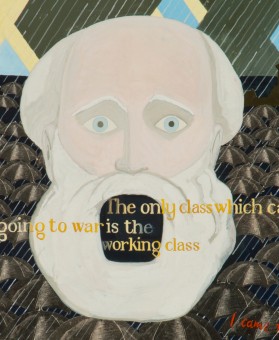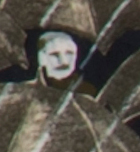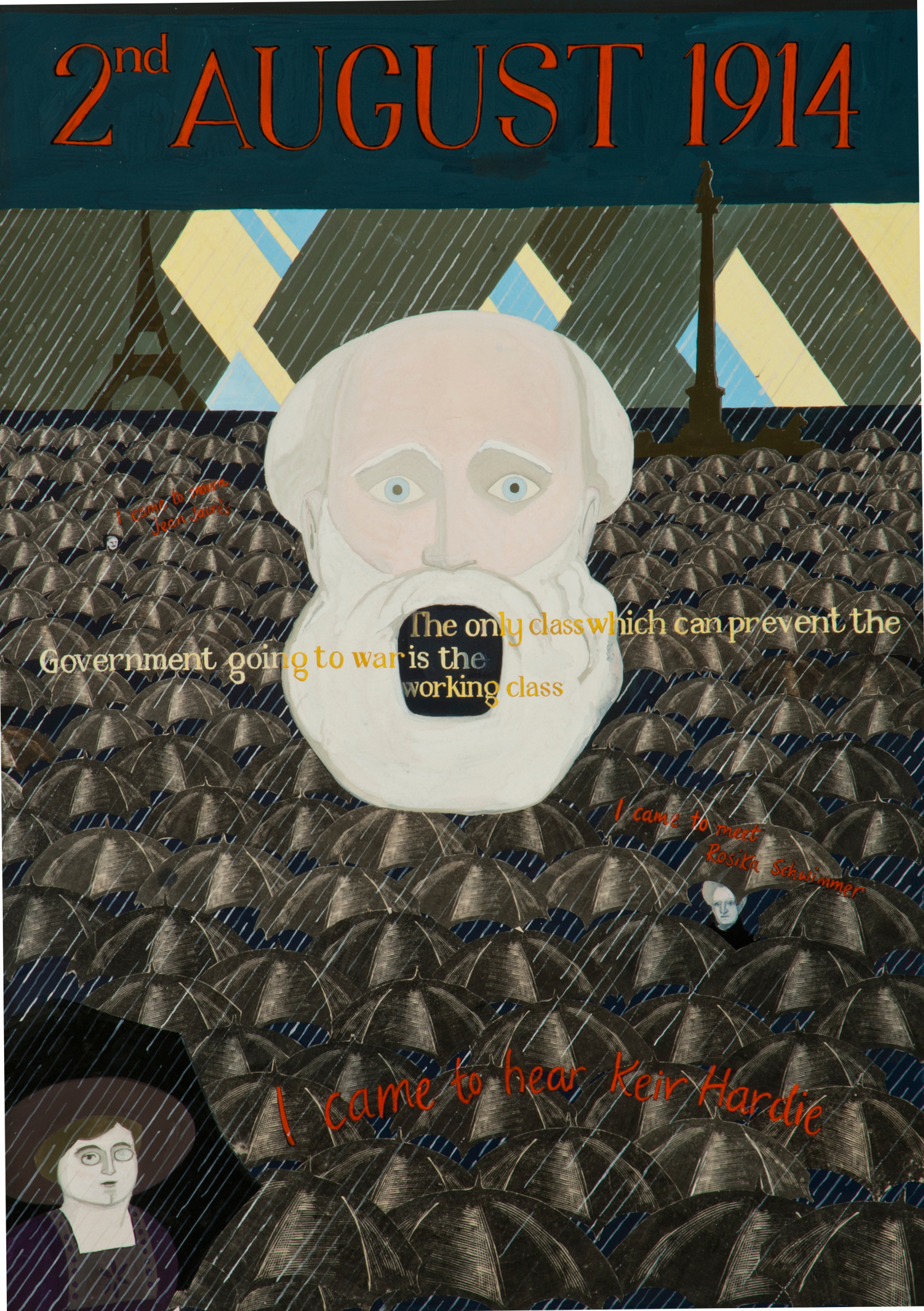 When the heavens opened up at 4.30pm, half an hour into the rally, ‘the solid core … stood gallantly to their umbrellas and cheered for the war against war’. [3]
When the heavens opened up at 4.30pm, half an hour into the rally, ‘the solid core … stood gallantly to their umbrellas and cheered for the war against war’. [3]
Standing on the plinth at the base of Nelson’s Column, legendary labour activist Keir Hardie had begun his speech by reminding the fifteen-thousand-strong crowd of the murder of the French socialist leader Jean Jaurès two days earlier. [4]
Like Hardie, a staunch internationalist [5], Jaurès had long predicted that a future war would involve  ‘millions of soldiers strewn in mud and blood’ and ‘millions of corpses’. [6] With his support, Hardie had spent the past four years trying to get the Second International – the international organisation of socialist and labour parties that included the German Social Democratic Party (SPD), the French Section of the Workers’ International (SFIO) and the British Labour Party – to agree a plan for a simultaneous international strike ‘on the first rumour of war’. [7] Now Jaurès was dead, killed by a fanatical nationalist. [8]
‘millions of soldiers strewn in mud and blood’ and ‘millions of corpses’. [6] With his support, Hardie had spent the past four years trying to get the Second International – the international organisation of socialist and labour parties that included the German Social Democratic Party (SPD), the French Section of the Workers’ International (SFIO) and the British Labour Party – to agree a plan for a simultaneous international strike ‘on the first rumour of war’. [7] Now Jaurès was dead, killed by a fanatical nationalist. [8]
‘We shall have no great anti-war campaign by the Liberals’, Hardie told the crowd. ‘The church will not lead in this holy war against crime and bloodshed. The task is left to the workers.’ [9]
Across Britain, probably over 100,000 Socialists and Labour supporters demonstrated against the looming war that Sunday afternoon, 2 August 1914. [10]
Two days later Britain declared war on Germany, and Hardie’s hope that the threat of international working-class solidarity could stop the conflict was finally destroyed.
‘To prevent and hinder war’
 At the International’s 1910 Congress, Hardie and the French socialist Edouard Vaillant had submitted a proposal that, ‘Among the means to be used in order to prevent and hinder war, the Congress considers as particularly efficacious the general strike …’ [11] But the German socialists had objected, so the idea was kicked back to the International’s secretariat for investigation. This meant that it could not be adopted before the next Congress, then scheduled for 1913, later pushed back to September 1914. [12]
At the International’s 1910 Congress, Hardie and the French socialist Edouard Vaillant had submitted a proposal that, ‘Among the means to be used in order to prevent and hinder war, the Congress considers as particularly efficacious the general strike …’ [11] But the German socialists had objected, so the idea was kicked back to the International’s secretariat for investigation. This meant that it could not be adopted before the next Congress, then scheduled for 1913, later pushed back to September 1914. [12]
The idea of an anti-war strike had a long pedigree: the Dutch socialist Ferdinand Nieuwenhuis had had a similar resolution rejected at the International’s 1891 Congress; as had Jaurès and others at the 1907 Congress. [13] However, in the months following the 1910 Congress Hardie began to articulate this old idea with a new twist. Past proposals had envisaged a reactive strike in response to the actual outbreak of war, but Hardie now spoke of a preventive strike (‘if war is threatened’) before ‘the war fever had maddened the blood of the people’. [14] Crucially, he hoped that, ‘The very threat of the possibility of such a strike would make statesmen pause before sanctioning its outbreak’. [15]
‘We will be dead in our graves’
Over the next four years he pushed the idea in speeches and at conferences. Resolutions endorsing the International’s enquiry were passed at the Independent Labour Party (ILP) and Labour Party conferences in 1911 and 1912 respectively [16], and a questionnaire was circulated to trade unions and trades councils, canvassing their opinions on whether the International should plan for a co-ordinated preventive strike. [17]
However, the strike’s supporters struggled to get responses [18], forcing them to drop an anti-war strike proposal that they had planned to put forward at the 1913 Labour Party Conference – just as the strike’s supporters had failed to make any headway with the idea at an Extraordinary Congress of the International the previous year. [19]
The British unions were beginning to move in 1913: the National Transport Worker’s Federation’s national conference recommended ‘a general stoppage of work among all transport workers who are engaged in the transportation of troops and munitions of war’ in order to prevent war, and the TUC passed a resolution initiating its own inquiry into the viability of an anti-war strike. [20]
Moving the latter resolution – which was passed without dissent – Liverpool docker F. Sanderson had noted that:
‘[I]f we leave it to peace conferences or to Parliament some of us will be dead and in our graves before effective steps will be taken to stop war’. [21]
A matter of bluff
 Nonetheless, at the war’s outbreak ‘Hardie and his comrades were just beginning to build support for the idea of an anti-war strike’, which had yet to be accepted by either British workers or the International as a settled policy. [22]
Nonetheless, at the war’s outbreak ‘Hardie and his comrades were just beginning to build support for the idea of an anti-war strike’, which had yet to be accepted by either British workers or the International as a settled policy. [22]
Moreover, there is good reason to believe that the International would have been unable to implement such a policy, even if it had been adopted – and that Hardie and the International’s other members were well aware of this fact. [23]
‘[I]n no European country did a member of party of the International possess influence over a majority of the working people’ [24] and, even during peacetime conditions, the International Miners’ Federation and the British mining and transport unions ‘had discovered that they were virtually powerless to organize an effective boycott of coal supplies to Belgium’ in support of a planned strike in March 1913. [25]
For Hardie, Jaurès and others, the anti-war strike was largely a matter of bluff – one that they had not yet even been able to breathe life into. [26]
A ‘very, very radical feminist’
Four days after the Trafalgar Square rally, Hardie was howled down at a ‘peace’ meeting in Aberdare. [27] Despite 25 years of anti-war activism, in the weeks and months that followed he ‘found it increasingly difficult to sustain any viable line of criticism against the war, so apparently overwhelming was the national support for the government’. [28]
 Fortunately, other younger activists were waiting in the wings, and would lose no time in taking action. Of these, perhaps none was as remarkable – or as dogged – as the Hungarian feminist Rosika Schwimmer.
Fortunately, other younger activists were waiting in the wings, and would lose no time in taking action. Of these, perhaps none was as remarkable – or as dogged – as the Hungarian feminist Rosika Schwimmer.
Recently appointed as the press secretary of the International Women’s Suffrage Alliance – which in 1914 had member groups in 26 nations [29] – the thirty-six-year-old Schwimmer was already a woman with a reputation for getting things done.
A ‘human dynamo’, she had founded the National Association of Women Office Workers, the Hungarian Association of Working Women, the Hungarian Council of Women, and edited the Hungarian feminist journal A Nö [The woman]. [30] Campaigning on a wide range of issues from birth control to child labour, she also wrote fiction, was the ‘first woman member of the Foreign Correspondents Club’ (in Britain) and the first foreign woman to be invited to address the House of Commons Foreign Affairs Committee. [31]
Describing herself as a ‘very, very radical feminist’, her ’round face, narrow nose … [and] aristocratic gold pince-nez, gave her a striking appearance’. [32]
‘The breakdown of the world’
On 9 July 1914, more than two weeks before the Austro-Hungarian ultimatum to Serbia, Schwimmer had warned the British Chancellor, Lloyd George, of the dangers of a European conflagration in the wake of Franz Ferdinand’s assassination [33], and on 29 July she helped to deliver an IWSA appeal to the Foreign Office, urging the latter ‘to leave untried no method of conciliation or arbitration which may avert deluging half the civilised world in blood.’ [34]
On 2 August 1914 she was in the crowd in Trafalgar Square [35], and she was one of a number of international speakers at the the IWSA’s two-thousand-strong eleventh-hour peace rally at the Kingsway Hall two days later. [36]
When the latter finished, Schwimmer and her friend Chrystal Macmillan joined the crowds in Whitehall, and were present as Big Ben struck midnight and the crowd began to shout ‘War is declared!’. [37]
Returning home she was unable to sleep, and as dawn broke she penned a four-page ‘Open Letter’, addressed to ‘All Men, Women and Organisations who want to stop the international massacre at the earliest possible moment.’ [38]
Asserting that ‘what is going on today is not merely a war, but the breakdown of a world – the earthquake of civilisation’, she advocated the formation of an ‘International Watching Committee’ composed of representatives from the governments of the neutral countrues, that would sit in Norway and send offers to mediate to the warring governments on a daily basis. [39]
‘The repeated offers,’ she explained, would allow the combatants ‘to accept instead of to ask for mediation’, allowing any of them ‘to climb down any moment before they [we]re absolutely exhausted, whether … victorious or defeated’. [40]
A Women’s Foreign Legion
This vision would now consume all of her considerable energies for the next nineteen months. [41]
She immediately resigned from her job with the IWSA in order to focus on anti-war activism, issued a call for foreign women living in England who were willing to ‘support any serious effort organised to urge mediation on the part of the States not yet involved in war’ to form a ‘Women’s Foreign Legion’, and tried to assemble a delegation of prominent English men and women to travel with her to the US to meet President Wilson in support of her mediation plan. [42]
Sending messages – mostly by telegram – to all of the IWSA’s national sections, she received positive responses from representatives in France, Germany, Hungary, Holland, Sweden and Norway. [43] Forced to sell her jewellery and typewriter in order to remain solvent ‘she even tried to sell her clothes in order to be able to telegraph more contacts in European countries’. [44]
On 25 August 1914 she left Britain alone, and within days of her arriving met with Wilson to push her idea for a standing conference of neutral nations. [45]
Sixty cities, 12,000 telegrams
Unsuccessful, she then embarked on a speaking tour of the US, ‘[s]peaking three to six times a day, not only in public halls but on street corners and at factory gates’. [46]
By December 1914 she had spoken in at least 60 cities in 22 states. [47] At the end of every speech she would urge them ‘to send a resolution – a copy of which was on every seat – to [Wilson] insisting that he demand immediate cessation of hostilities’. [48] She later found out that a special room had been created in the White House to file peace resolutions and petitions, many of which were doubtless generated through her work. [49]
The following year, at the 1915 International Women’s Congress at the Hague, she played a decisive role in having the Congress mandate a group of elected delegates to take its resolutions in person to the heads of the belligerent and neutral governments, and then led the delegation that visited the neutral countries. [50]
Returning to the US, Schwimmer then orchestrated a campaign, through the Women’s Peace Party, that resulted in Wilson – who she met again on 26 November 1915 – receiving 12,000 telegrams in 3 days, demanding that the President start a conference of neutrals. [51]
‘A woman without a country’
She then played a pivotal role in Henry Ford’s ill-fated ‘Peace Ship’ – the purpose of which was to set up a people’s mediating conference in Scandinvia – before finally collapsing with heart trouble. [52] Following the downfall of the Austro-Hungarian empire in 1918, she was briefly Hungary’s Ambassador to Switzerland – the first female Ambassador in modern history. [53]
Persecuted by both communists and fascists during Hungary’s post-war political turmoil, Schwimmer returned to the US in 1921, only to find herself a victim of the Red Scare. [54]
Denied US citizenship ‘because, as a pacifist, she refused to pledge her willingness to bear arms in defense of the country’ she became in her own words ‘a woman without a country’. [55]
Nonetheless, ‘she remained forceful, determined, outspoken, and unshakeably committed to her ideals’, writing, shortly before her death, that ‘we sought equality for our half of the human race, not at the lowest, but at the highest level of human aspirations’. [56]
Other people in the picture
In addition to Hardie and Schwimmer, two other individuals – both of whom were present in the Square as speakers on 2 August 1914 [57] – are visible in the picture.
 The President of the Miner’s Federation of Great Britain, Robert Smillie, had done his best to commit the International Miner’s Federation to Hardie’s anti-war strike plan during his Presidency of the latter organisation. [58] On 2 August he told the crowd in Trafalgar Square ‘that if a strike of European workers could stop the war, the miners would be part of it’. [59] During the war, two of his sons volunteered, while a third was jailed as a conscientious objector. [60] He is perhaps best remembered today for his response to the famous recruiting poster question, ‘Daddy, what did YOU do in the Great War?’: ‘I tried to stop the bloody thing my child’. [61]
The President of the Miner’s Federation of Great Britain, Robert Smillie, had done his best to commit the International Miner’s Federation to Hardie’s anti-war strike plan during his Presidency of the latter organisation. [58] On 2 August he told the crowd in Trafalgar Square ‘that if a strike of European workers could stop the war, the miners would be part of it’. [59] During the war, two of his sons volunteered, while a third was jailed as a conscientious objector. [60] He is perhaps best remembered today for his response to the famous recruiting poster question, ‘Daddy, what did YOU do in the Great War?’: ‘I tried to stop the bloody thing my child’. [61]
 Seventy years old at the time of the 2 August demonstration, Charlotte Despard was a militant suffragist who had once spent 21 days in solitary confinement for her activism. [62] In 1907 she had helped co-found the Women’s Freedom League, a militant breakaway from Emmeline Pankhurst’s autocratic Women’s Social and Political Union. [63] In 1917 she became a stalwart of the Women’s Peace Crusade, telling an audience in one speech: ‘I should like the words “alien” and “foreigner” to be banished from the language. We are all members of the same family.’ [64]
Seventy years old at the time of the 2 August demonstration, Charlotte Despard was a militant suffragist who had once spent 21 days in solitary confinement for her activism. [62] In 1907 she had helped co-found the Women’s Freedom League, a militant breakaway from Emmeline Pankhurst’s autocratic Women’s Social and Political Union. [63] In 1917 she became a stalwart of the Women’s Peace Crusade, telling an audience in one speech: ‘I should like the words “alien” and “foreigner” to be banished from the language. We are all members of the same family.’ [64]
NOTES
[1] Douglas Newton, Darkest Days: The Truth Behind Britain’s Rush to War [hereafter ‘Newton 1’], 1914, Verso, 2014, p. 169.
[2] Anne Wiltsher, Most Dangerous Women: Feminist Peace Campaigners of the Great War, Pandora, 1985, p. 25.
[3] ‘Our London Correspondent’, Manchester Guardian, 3 August 1914, cited in Newton 1, p. 170.
[4] The demonstration, which had originally been called by the Daily Herald, took place with only two days notice. On 31 July, the British section of the International decided to place ads in seven major London newspapers, including the Times, and telegraphed 50 branches of the Independent Labour Party, urging them to organize demonstrations (Newton 1, op. cit., p. 165). The ads appeared the next morning under the headline ‘WAR AGAINST WAR’ (ibid.).
[5] By 1914 Hardie had been involved in campaigning for peace and against militarism for the best part of a quarter-century. During the 1890s ‘[o]pposition to war and imperialism was a constant theme in the pages of the Labour Leader’, the socialist newspaper owned and edited by Hardie (Douglas Newton, British Labour, European Socialism and the Struggle for Peace, 1889 – 1914 [hereafter ‘Newton 2’], Oxford University Press, 1985, p. 20). Hardie and his Independent Labour Party opposed the Boer War, exposed attempts by arms companies to supply miniature rifles to the Government for use in schools, and launched campaigns for arms reduction and against conscription (ibid., pp. 126 – 127, 156 – 159, 202 – 203, 240 – 241, 310 – 311).
[6] Margaret MacMillan, The War that Ended Peace: How Europe Abandoned Peace for the First World War, Profile Books, 2014, p. 289.
[7] Newton, op. cit., p. 256. The words quoted here are from a proposal for the International, drafted by the ILP in May 1910.
[8] MacMillan, op. cit., p. 582.
[9] Newton 1, p. 169.
[10] David Boulton, Objection Overruled, MacGibbon & Kee, 1967, p. 33. Public meetings ‘held in public places’ are known to have taken place in Manchester, Leicester, Huddersfield, Glasgow, Newcastle, Oldham, Ipswich, Norwich, Chester, Rochdale, Northampton, Keighley, Birmingham, Bingley, Great Yarmouth, Exeter, and Hyde (Newton 2, p. 327). The Labour Leader reported protest meetings at 42 locations around the country between 30 July – 4 August, while the Scottish ILP claimed more than 100 meetings in Scotland (Newton 1, pp. 17 1 – 172).
[11] Newton 2, p. 259.
[12] Newton 2, pp. 261-2, 272.
[13] Newton 2, p. 51; Murray Bookchin, The Third Revolution: Popular Movements in the Revolutionary Era. Vol. 3, Continuum International, 2005, p. 126.
[14] Newton 2, pp. 263 – 264. The quoted passages are from speeches in Dundee and Birmingham respectively, made in October 1914 during the ILP’s ‘Autumn Campaign’ against armaments. The idea for a preventive strike had been mooted for the first time within the ILP in a report dated May 1910 (ibid., pp. 255 – 258).
[15] Newton 2, p. 263.
[16] The Labour Party passed its resolution by 1,323 votes to 135 (Newton 2, p. 268).
[17] The questionnaire asked: ‘Are you in favour of the organized working class movements of all countries being asked to come to a mutual agreement whereby in the event of war being threatened between any two or more countries the workers of those countries would hold themselves prepared to try and prevent it by a mutual and simultaneous stoppage of work in the countries affected?’ (Newton 2, p. 269 – 270).
[18] At least six trades councils did respond positively: Bradford, Manchester, Blackpool, Sheffield, Huddersfield and Belfast – with the Sheffield council voting 51 – 3 in favour (Newton 2, p. 276).
[19] Newton 2, pp. 274 – 275.
[20] Newton 2, pp. 276, 278.
[21] Newton 2,. p. 279.
[22] Newton 2, p. 281.
[23] Eg. In mid-July 1914, acknowledging that ‘we French … have not been able to create a great economic organization of the proletariat’, Jaurès stated that ‘We know that at the present time in Europe, no national section of the working class can give a guarantee to that of other countries that it will join in the common action’ (Newton 2, p. 292).
[24] Newton 2, p. 35.
[25] Newton 2, p. 278.
[26] Newton 2, p. 291.
[27] Kenneth O. Morgan, Keir Hardie: Radical and Socialist, Weidenfeld & Nicholson, 1984, p. 265. The quotation marks are Morgan’s.
[28] Morgan, op. cit., p. 268. According to Morgan, though Hardie himself ‘was unmistakably hostile to the war: it affronted every principle he held dear … In the press Hardie’s views went through various gyrations that reflected his agony of mind.’ (ibid., p. 266). For example, writing in the Pioneer on 15 August 1914, he asserted that: ‘A nation at war must be united especially when its existence is at stake. With the boom of the enemy’s guns within earshot, the lads who have gone forth by sea and land to fight their country’s battles must not be disheartened by any discordant note at home … We must see the war through but we must also make ourselves so familiar with the facts as to be able to intervene at the earliest possible moment in the interests of peace.’ (ibid.).
[29] Newton 1, p. 103.
[30] Wiltsher, op. cit., p.9; Beth Wenger, ‘Rosika Schwimmer’, Jewish Women: A Comprehensive Historical Encyclopedia. 20 March 2009, Jewish Women’s Archive, http://jwa.org/encyclopedia/article/schwimmer-rosika.
[31] Wiltsher, op. cit., pp. 13, 30.
[32] Wiltsher, op. cit., p.10.
[33] Wiltsher, op. cit., pp. 13 – 14. According to Wiltsher, Schwimmer told Lloyd George that ‘unless something was done immediately to appease the resentment, she believed it would result in war with Serbia, with the very high risk that other European countries could be dragged in.’ By contrast, at the Second International’s meeting on 29 July 1914, ‘no one believed that an escalation of the conflict into a European war was likely’ (Newton 2, p. 322).
[34] Wiltsher, op. cit., p. 228, n.11.
[35] Wiltsher, op. cit., pp. 18 – 19.
[36] Wiltsher, op. cit., pp. 22 – 23; ‘Protest Against War’, Jus Suffragii, 1 September 1914.
[37] Wiltsher, op. cit., p. 23. (Note that Wiltsher wrongly gives the time as 11pm – see below). A fellow suffragist, Macmillan had ‘refused to leave Schwimmer alone in Whitehall, because she was afraid someone would recognise her as a foreigner and turn nasty’ (ibid., p. 24).
Jeremy Paxman’s BBC television series Britain’s Great War gets off to a bad start with his assertion that Britain ‘had warned that if Germany didn’t back down by eleven [pm GMT] it was war’ (‘War Comes to Britain’, BBC 1, first broadcast 27 January 2014).
In fact there was no such ultimatum, the only time limit that had been relayed to Germany had referred to 12 midnight in London, and around 10pm GMT a small clique within the British Cabinet had already made the decision for war (Newton 1, pp. 263 – 264, 266 – 267, 270, 271, 276). Moreover, by 10.45pm they had had this decision authorised by a Privy Council of four, ‘not one elected man among them’ (ibid., p. 276).
Two telegrams were sent to Britain’s ambassador in Berlin, Edward Goschen, on 4 August 1914, each with a message for the the latter to relay to Germany’s Foreign Minister, Jagow.
The first, sent before Britain had learned of Germany’s invasion of Belgium, requested an assurance from Jagow ‘that the [German] demand made upon Belgium not be proceeded with’, specifying no time limit but asking for ‘an immediate reply’ (ibid., pp. 263 – 264). The second telegram, sent at 2pm, reiterated the request for a German assurance of Belgian neutrality, asking for ‘a satisfactory reply’ to ‘be received here by 12 o’clock midnight’ (ibid., pp. 266 – 267. If such a reply was not received then the telegram instructed Goschen to ask for his passports and ‘say that His Majesty’s Government feel bound to take all steps in their power to uphold the neutrality of Belgium and the observance of a Treaty to which Germany is as much a party as ourselves.’ (ibid., p. 267). As Douglas Newton observes, the only certainty regarding this ambiguous message was that Britain would break diplomatic relations if it did not receive its ‘satisfactory reply’ (ibid.).
When he appeared in Parliament later that afternoon, the British Prime Minister, Herbert Asquith, ‘never used the term “ultimatum” and never announced that war would be declared at midnight’ – though the Times headlined it as such the following day (ibid., p. 270).
The ultimate decision for war was taken around 10pm by a small clique of five Ministers ‘bunkered down in the Cabinet room’ (ibid., p. 271). Though no request for military assistance had been received from Belgium, it was already on its way (ibid.).
At midnight, when – as the Times reported on 5 August 1914, in an article entitled ‘London and the Coming of War: Impressive Midnight Scene’ – the crowd grew silent in anticipation, ‘Britain’s war was in fact already an hour old’ (ibid., p. 277; Paul Peppis, Literature, Politics, and the English Avant-Garde: Nation and Empire, 1901-1918, Cambridge University Press, 2000, p. 196 n. 34).
[38] Wiltsher, op. cit., p. 24.
[39] Ibid., p. 25.
[40] Ibid., (emphasis in original). Wiltsher notes (in her book, published in 1985) that, ‘The vision of such glorious common sense and understanding of the human psyche being part of international diplomacy is heart-warming even today’ (ibid., pp. 25 – 26).
[41] Ibid., p. 161.
[42] Ibid., pp. 26 – 27, 29, 31.
[43] Ibid., pp. 31, 34.
[44] Ibid., pp. 31 – 32.
[45] Ibid., p.34. Schwimmer used her US contacts in the IWSA to organise a meeting with Wilson on 18 September 1914 (David S. Patterson, The Search for Negotiated Peace: Women’s Activism and Citizen Diplomacy in World War 1, Routledge, 2008, p. 37).
[46] Wiltsher, op. cit., p. 46.
[47] Ibid.
[48] Ibid., p. 47.
[49] Ibid.
[50] Ibid., pp. 101 – 102. ‘[G]iven only three minutes to speak by the Congress’ Chair, Jane Addams, [Scwhimmer] convinced [it] to support a proposal that sent women to meet with the leaders of both neutral and belligerent nations in order to urge mediation’ (Beth S. Wenger, ‘Radical Politics in a Reactionary Age: The Unmaking of Rosika Schwimmer, 1914 – 1930’, in Journal of Women’s History, 1990, vol. 2, no. 2, p. 72). The thirteen delegates divided into two groups and visited the top statesmen in 14 capitals, including Berlin, London, Le Havre (seat of the deposed Belgian government), Budapest, Petrograd, Vienna and Washington (Wiltsher, op. cit., p. 103). Schwimmer led the group that visited the neutral countries. Among other things they managed to persuade the Swedish Foreign Minister to agree to discuss the mediation plan in the Swedish cabinet. To secure this the delegates had had to provide ‘sufficient evidence’ that the establishment of such a conference would not be ‘unacceptable’ to the belligerent governments (ibid., p. 111, 118). In Vienna, the PM told the delegates that ‘These are the first sensible words that have been uttered in this room for ten months!’ (ibid., p. 114).
[51] Ibid., p. 123.
[52] Wiltsher, op. cit., pp. 157 – 161. Subject to ‘ridicule and criticism from the time it was announced’, the ‘Peace Ship’ was the result of a meeting between Schwimmer and Ford, who had pledged $10m ‘to fund an effective scheme which would take action to stop [the war]’ (Wenger, op. cit., p. 74; Wiltsher, op. cit., p. 157). Nonetheless, a people’s mediating conference was ultimately established as a result of the venture, which Wiltsher credits with having ‘helped keep the small neutral countries out of the war, when there was great pressure on them to join’ (ibid., p. 162).
[53] Wiltsher, op. cit., p. 208. Wiltsher credits Schwimmer with being the first female ambassador ever, but Catherine of Aragon appears to have beaten her to this by several centuries: according to Alison Weir, Catherine was appointed Spain’s ambassador to England in 1507 (Alison Weir, The Six Wives of Henry VIII, Random House, 2011, p. 59).
[54] After the communists took power in 1919, Schwimmer ‘was refused permission to leave the country’ and ‘nearly starved because she could not get work as a “bourgeois feminist”‘ (Wenger, op. cit., p. 77; Wiltsher, op. cit., p. 216). After the communists were, in turn, overthrown by the right, death squads took her photograph with them on house-to-house searches, telling people, ‘We’ll get that bitch next.’ (ibid.). After she arrived in the US her reputation as a radical and a pacifist ‘made it impossible for [her] to support herself and her mother and sister, who lived with her’ and she was forced to depend upon financial assistance from her friend Lola Maverick Lloyd (Wenger, op. cit., p. 84).
[55] Ibid., pp. 66, 88. During her five-year legal battle she explained: ‘I am an absolute atheist. I have no sense of nationalism, only a cosmic consciousness of belonging to the human family’ (ibid., pp. 86 – 87). ‘The Acting Solicitor General observed that in an “ordinary housewife” her beliefs would not matter, but “in the ‘brilliant Schwimmer mind’ those same beliefs were dangerous”‘ (ibid., p. 88).
[56] Ibid., p. 91; ‘We must not fail in our pledge to end war’, Peace News, 23 July 1948.
[57] Newton 1, p. 168.
[58] Newton 2, p. 89, 277.
[59] Wiltsher, op. cit., p.19.
[60] Torquil Cowan, Labour of love: the story of Robert Smillie, Neil Wilson Publishing, 2011, pp. 231, 238.
[61] Adam Hochschild, To End All Wars, MacMillan, 2011, p. 151.
[62] Ibid., p. 45.
[63] Midge Mackenzie, Shoulder to Shoulder, Penguin, 1975, p. 64.
[64] Hochschild, op. cit., p. 279.




